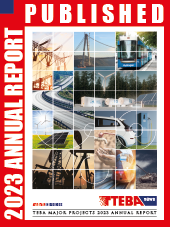12/2/2020
EEL Events, PPP in Turkey Forum (IV)
EBRDDeputy Head for Turkey, Şule Kılıç: "Institutional capacity and prioritization of projects are the keys for the PPP industry. Funding is provided as long as the contractual structure is established correctly. It has become all the more important to prioritize projects in the upcoming period. Institutional capacity should be further built up to use the PPP model in the projects of the municipality"...
We continue to present the important addresses from the Turkey Public-Private Partnership (PPP) Forum organized online by London-based EEL Events on November 26-27, 2020, to which TEBA contributed as a press partner. Speaking at the panel titled "Where are the PPP Opportunities in Turkey?" moderated by Burcu Tokatlı Ahıska, the General Coordinator of TEBA, Deputy Head for Turkey at the European Bank for Reconstruction and Development (EBRD), Şule Kılıç, reminded that the first example of the PPP structure as we know it was the Eurasia Tunnel Project and that EBRD has been involved in Turkey's PPP market from this Project, since 2009, and they financed 8 PPP city hospitals in the process. "Funding is provided as long as the contractual structure is established correctly": Emphasizing that the institutional capacity and prioritization of projects were the key for the PPP industry, Kılıç stated that the healthcare industry was the correct industry in this regard, and the contractual structure was set up correctly in the urban hospital projects. She stated that urban hospitals helped Turkey avoid capacity problems in the healthcare industry in the course of the COVID-19 pandemic. "This should also be reminded: When we were funding the urban hospitals, it was the best time for funding in the PPP market, repayment periods rose to 18-20 years, and the cost of loans and pricing were much better than they are now," said Kılıç, highlighting that 12 or 13 urban hospitals were funded by commercial banks. So she implied that funding would be provided as long as the structure is established correctly. "Prioritization of projects is more important than ever": Pointing out that COVID-19 affected developing countries more than it did developed ones, Kılıç emphasized that prioritization of projects became more important than ever. Noting that it was true that funding costs were higher for the private sector than for the public sector, Kılıç stated that this, however, did not mean that the government could fund all investments on its own. Also arguing that the PPP model may not be suitable for every project, Kılıç emphasized that it was important to determine what projects to apply the PPP model by a value for money analysis. "Alternative funding models should be used": Underlining that alternative and new funding models would be required for the PPP projects in the upcoming period, Kılıç reminded that bonds were issued for the Elazığ Hospital Project. Pointing out that the Capital Markets Board collaborated with other authorized bodies to create new funding products, Kılıç stated that legislation would be made for new instruments including project-based securities, asset securities, and convertible bonds. She also underlined that new financing tools such as sukuks and Islamic financing and project bonds could be used. "Institutional capacity should be built up for municipal projects": Lastly, regarding the new effort of the Ministry of Environment and Urbanization for a legislation for the sewage projects of municipalities, Kılıç noted that municipalities had limited resources, and they agreed that PPP model could be used for municipal projects. Also pointing out that the corporate capacity should be improved at the level of local authorities, Kılıç said: "Public and private sectors enter into a very long-term partnership in the PPP model. It is not right to expect the private sector to carry out all processes just for undertaking the task of operating a project. Institutional capacity to implement and follow up such long-term contracts should be built up in the public sector."
Annual Report
